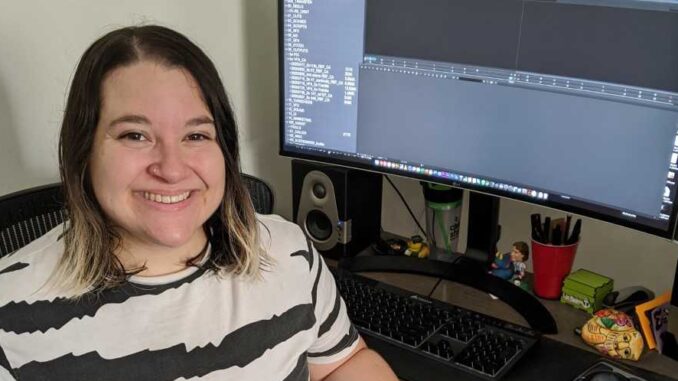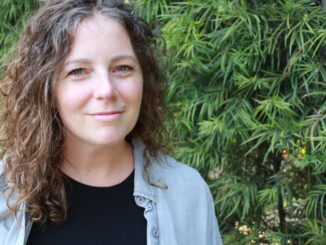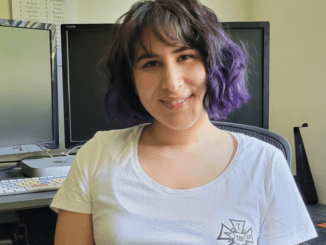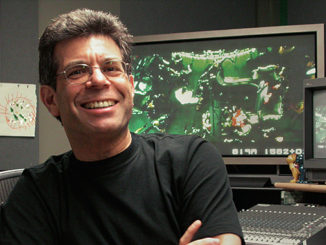
Where are you currently employed?
Currently working from home for Netflix.
Current projects?
“Yes Day” directed by Miguel Arteta, edited by Jay Deuby.
Describe your job.
As an assistant editor, my job is to help prepare the dailies during production for my editor. After I receive them from the post production facility, I feed them into the AVID and cross-check them with the paperwork given to me by production (camera reports, sync logs, audio, scripts). After quality-checking them for picture or audio issues, I prep them for editorial use, including marking “Action” on all takes for the editor. My other duties include scripting the scenes as they come in — copy-and-pasting from the show’s script into the AVID as a way to identify shot content in raw dailies — or addressing notes the editor drops for me in their timeline throughout the day. I’m also there to clean things up, offer some music ideas if a scene is needing inspiration, add background temp sound effects as scenes progress, and create temporary visual effects placeholders for our vendors to match.
How did you first become interested in this line of work?
I was originally in trailer editing but had always been interested in scripted format. I produced Latinx marketing spots for Disney and Pixar for a few years, writing scripts and building upon the content for our demographics. After several years, I found myself drawn more to a film’s storytelling than its marketing. Although I learned so much on the job at Trailer Park, the entertainment marketing agency where I worked, I set my sights on assisting an editor who was creating the story for a film or TV show. I love storytelling, and I wanted to challenge myself to do it in longer formats.
Who gave you your first break?
I was fortunate enough to have a mentor, David Bess, whom I had met in my senior year of college when we connected through the University of Oregon’s Cinema Studies alumni network. David reached out on my behalf to a former colleague who happened to work where I wanted to work, Trailer Park. He passed my name along at an opportune moment when the agency’s satellite office was hiring a coordinator/assistant editor. David has had my back ever since.
What was your first union job?
While all my work at trailer houses had been on union films, my shop was non-union. The first union gig I took was this year, as assistant editor for Jay Deuby on Miguel Arteta’s film “Like a Boss.”
What credits or projects are you proudest of, and why?
“Like a Boss.” I’m honored and humbled to have worked with an iconic director like Miguel Arteta, who allowed me onto his film even though I only had my agency experience. I feel really proud of my efforts and the leap of faith it took to switch gears after embedding myself so fully in marketing in years past. I’m also proud that, as a Latinx individual in the union, I can be seen and heard by other Latinxs in the industry.
What was your biggest challenge in your job (or on a particular project) and how did you overcome/solve it?
I think the technical aspects of turnovers and learning to get them done in a timely manner was the most challenging aspect for me, especially visual effects turnovers. They require so much attention to detail and consistency. Every night for a few weeks, I read about how to master Filemaker Pro, and I’m proud that I managed to learn it with relatively little guidance. At the same time, though, it’s less than ideal to study highly technical things late in the evening when no one is around to ask for help. The more turnovers I did, the more I learned to reach out during the day to more experienced folks and then apply their suggestions to my workflow. For the last two films I worked on, I oversaw the visual effects editing from start to finish. It was exciting to finally send a turnover that had few if any errors.
What was the most fun you’ve had at work?
Stephanie Ito, Executive Vice President of Post Production at Paramount Pictures, overheard me talk about how much I love ice cream and surprised me on a particularly busy week with ice cream macaroon sandwiches from Milk Bar. It wasn’t just one sandwich; there were 12 flavors to choose from! After that, if she caught me in the elevator, she’d ask me how I was doing and if I wanted any ice cream that day. It brings a huge smile to my face!
Jobwise, what do you hope to be doing five years from now?
Sincerely and optimistically, I’d like to have cut at least two features and perhaps some TV shows. I love independent cinema. I want to tell stories that historically have been marginalized in film and cut them in a way that increases on-screen representation of underserved groups in our society. Maybe in the future, I can be part of larger organizations like ACE that promote diversity in storytelling and honor folks in the industry by encouraging them to keep on their path towards visibility.
What are your outside activities, hobbies, passions?
I like skateboarding with friends. As an adult, I think it’s fun to see others my age doing that and not take it too seriously. I also dance with the LA Unbound Dance Company and have choreographed hip hop dances on occasion. I’m passionate about womxn’s access to healthcare, and I volunteer as a clinic escort on weekends. I’m also a big advocate for mental health resources and transparency. Removing the taboo surrounding mental health issues in relation to our jobs in editorial is a big deal for me. I’m motivated to ask my fellow union members what they need in order to be healthy and succeed on the job.
Favorite movie(s)? Why?
“Clueless” (1995) is my favorite film of all time. I learned to speak conversational English by watching it repeatedly on TV. I’m a fan of dark absurd comedies, so “The Big Lebowski” (1998) checks all the boxes for me. I think it’s relatable in an odd way, and I sometimes find myself aspiring to channel The Dude energy in my daily work vibes. That conflicts with my also wanting to embody Cher from “Clueless,” but they are not mutually exclusive.
Favorite TV program(s)? Why?
Lately, I’m enjoying “Ramy” and “PEN15” on Hulu. They are both authentic stories that I relate to on different levels, and they utilize comedy in subversive and unexpected ways. I respect the editorial work that goes into both shows. The casting is fantastic as well. They are shot with an intimate lens focused on the characters we want to root for – but maybe also want to shake for not making good choices. “Ramy” is an excellent study in moral ambiguity and the slippery slope of good intentions. “PEN15” is a massive throwback to my middle-school days. It’s traumatizing and hilarious, scary and personal. The creators brilliantly conceived that playing their 13-year-old selves alongside other actual middle-school-aged kids was the perfect casting strategy to tell this story. It’s original and refreshing, something I didn’t expect from a show called “PEN15.”
Do you have an industry mentor?
I have a couple of mentors I can safely approach with anything, professional or personal. My mentor from my marketing days is David Bess who, as I mentioned earlier, got me my first break. Now, in scripted features and TV, I’m being mentored by Jacquelyn Le. Back in film school, I hoped and yearned to find a mentor exactly like Jacquelyn when I got into the industry. She came up in agency work and then transitioned into scripted editing, so her career trajectory was similar to what I’ve been experiencing up to this point in my career. It’s really helpful to have someone like her guide me as I navigate more and more shows. I’m eternally grateful for her patience and time spent answering my questions.
What advice would you offer to someone interested in pursuing your line of work?
I believe it’s really important to have hobbies and a life outside of assistant editing because it’s actually the best way I’ve built my network and met new people. I think that helped me find people in editorial who were invested in showing me how to navigate a career, together with other assistants they knew, and were willing to let me shadow them during their workday. It gave me an opportunity to ask questions without having the pressure of possibly failing on the job. After someone lands an assistant editor job, I’d say cut anything and everything you can. Get enough experience with the software, know how to solve problems, troubleshoot solutions, and be resourceful. Watch the cut as many times as you need in order to know what story the editor and director are trying to tell. And don’t lose sight of what storytelling means for you. A self-starting but humble and curious assistant editor can go really far. I try to keep all of this in mind as I step into my role every day at work.
Was there ever a circumstance when you had to rely on the Guild for help or assistance?
I attended an LGBTQIA steering committee roundtable discussion as I was seeking advice on how to manage queer politics and identity in the workplace. The roundtable discussion was fantastic and so open-minded. Everyone was there to find solutions to making their workplaces — and by extension, the union — safer. The union gained my trust big-time after that event.
Is there anything you’d like to say to your fellow Guild members, some words of encouragement?
Our mental health is sorely tested during this pandemic. Although everyone is fighting their own battles, we should be there to support each other and offer a helping hand when another union member needs something. Also, it’s our duty to increase representation of our historically marginalized BIPOC union members. That means we don’t let our brothers and sisters fall behind. We all deserve a chance to succeed alongside each other free of discrimination and racism, which we should never stop working to banish from the workplace — and everywhere else.
Compiled by David Bruskin
Interested in being featured in What Our Members Do? Contact Scott Collins at SCollins@editorsguild.com.





